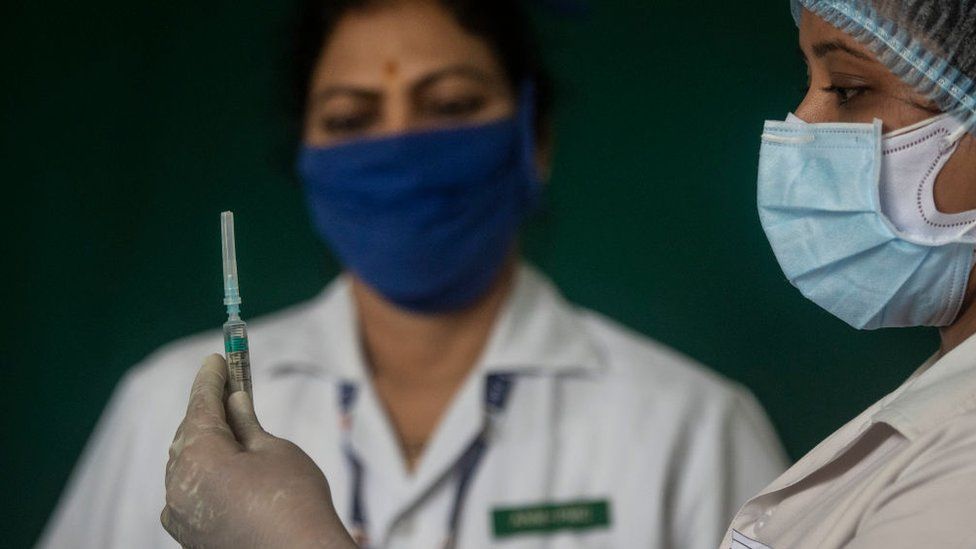When the coronavirus pandemic took hold in India, there were fears it would sink the fragile health system of the world’s second-most populous country.
But infections began to plummet in September, and now the country is reporting about 11,000 new cases a day, compared with a peak of nearly 100,000, leaving experts perplexed.
Experts have suggested many possible explanations for the sudden drop – seen in almost every region – including that some areas of the country may have reached herd immunity or that Indians may have some pre-existing protection from the virus.
Architects M B Ravikumar and his wife Madhu Kumar are relieved to see the steady decline in coronavirus cases. Both had tested positive for COVID-19 and Ravikumar had to be hospitalised for nearly two weeks.
Speaking of the days spent recovering in the ICU of a Delhi hospital, Ravikumar said he “did not know whether one would come back from that situation”.
Strain on hospitals eased
The Indian government has also partly attributed the dip in cases to mask-wearing, which is mandatory in public in India, with violations drawing hefty fines in some cities.
Determining what is behind the drop in infections could help authorities control the virus in the country, which has reported nearly 11 million cases and more than 155,000 deaths.
Some 2.4 million people have died worldwide since the virus was first detected in Wuhan, China, in December 2019.
India, like other countries, is assumed to miss many infections in its official records, and there are questions about how virus deaths are determined.
But the strain on the country’s hospitals has also eased in recent weeks, a further indication the spread is slowing.
When recorded cases crossed 9 million in November, official figures showed nearly 90 percent of all critical care beds with ventilators in New Delhi were full.
On Thursday, 16 percent of these beds were occupied.
That success cannot be attributed to vaccinations since India only began administering shots in January. But as more people are vaccinated, the outlook should look even better, though experts are also concerned about variants identified in many countries that appear to be more contagious.
Many explanations
Among the possible explanations for the fall in cases is that some large areas have reached herd immunity – the threshold at which enough people have developed immunity to the virus, by falling sick or being vaccinated.
But experts have cautioned that even if herd immunity in some places is partially responsible for the decline, the population as a whole remains vulnerable – and must continue to take precautions.
This is especially true because new research suggests that people infected with one strain of the virus could be re-infected with a new strain.
A nationwide screening for antibodies by Indian health agencies estimated that about 270 million, or one in five Indians, had been infected by the virus before vaccinations started – far below the rate of 70 percent or higher that experts say might be the threshold for the coronavirus, though even that is not certain.
But the survey offered other insight into why India’s infections might be falling.
It showed that more people had been infected in India’s cities than in its villages and that the virus was moving more slowly through the rural hinterland.
“In rural areas, the transmission rates are in any case low, and we are two-thirds rural. That’s something that we must keep reminding ourselves,” said Dr K Srinath Reddy, president of the Public Health Foundation of India.
Another possibility is that many Indians are exposed to a variety of diseases throughout their lives – cholera, typhoid and tuberculosis, for instance, are prevalent – and this exposure can prime the body to mount a stronger, initial immune response to a new virus.
“It is a combination of factors that gives the population immunity, but not this concept of herd immunity, which as I said is very nebulous,” said Dr Reddy.
Do not let your guard down
Despite the good news in India, the rise of new variants has added another challenge to efforts here and around the globe to bring the pandemic under control.
Scientists have identified several variants in India, including some that have been blamed for causing new infections in people who already had an earlier version of the virus.
But they are still studying the public health implications.
With the reasons behind India’s success unclear, experts are concerned that people will let down their guard.
Large parts of India have already returned to normal life. In many cities, markets are heaving, roads are crowded and restaurants nearly full.
“Danger still lurks around the corner,” warned Dr Reddy.
“If the mutants enter and they start rising in numbers, and particularly other susceptible sections of our population who have not been infected so far or have not been vaccinated so far get affected, then we can still have a sudden spike in the cases,” he said.

